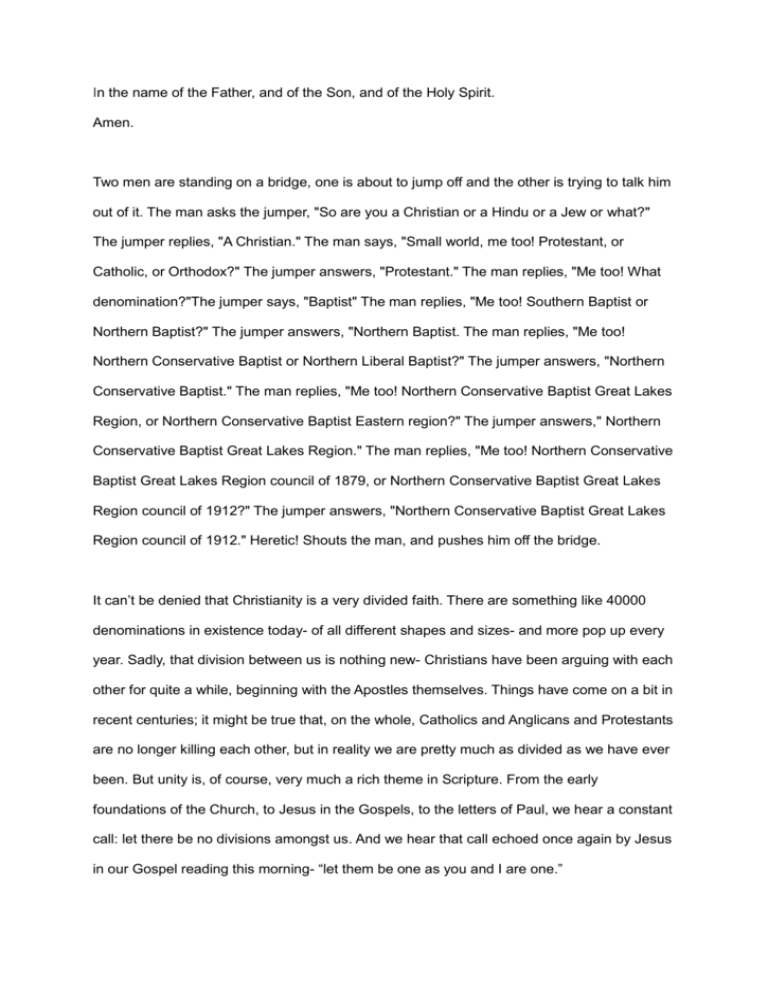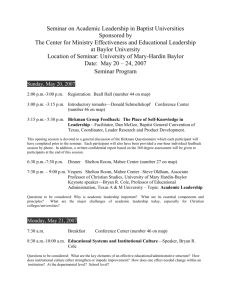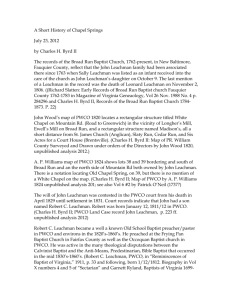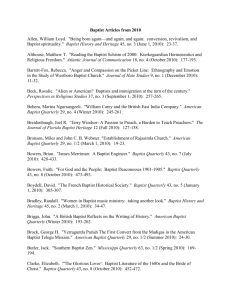John 17:20-26
advertisement

In the name of the Father, and of the Son, and of the Holy Spirit. Amen. Two men are standing on a bridge, one is about to jump off and the other is trying to talk him out of it. The man asks the jumper, "So are you a Christian or a Hindu or a Jew or what?" The jumper replies, "A Christian." The man says, "Small world, me too! Protestant, or Catholic, or Orthodox?" The jumper answers, "Protestant." The man replies, "Me too! What denomination?"The jumper says, "Baptist" The man replies, "Me too! Southern Baptist or Northern Baptist?" The jumper answers, "Northern Baptist. The man replies, "Me too! Northern Conservative Baptist or Northern Liberal Baptist?" The jumper answers, "Northern Conservative Baptist." The man replies, "Me too! Northern Conservative Baptist Great Lakes Region, or Northern Conservative Baptist Eastern region?" The jumper answers," Northern Conservative Baptist Great Lakes Region." The man replies, "Me too! Northern Conservative Baptist Great Lakes Region council of 1879, or Northern Conservative Baptist Great Lakes Region council of 1912?" The jumper answers, "Northern Conservative Baptist Great Lakes Region council of 1912." Heretic! Shouts the man, and pushes him off the bridge. It can’t be denied that Christianity is a very divided faith. There are something like 40000 denominations in existence today- of all different shapes and sizes- and more pop up every year. Sadly, that division between us is nothing new- Christians have been arguing with each other for quite a while, beginning with the Apostles themselves. Things have come on a bit in recent centuries; it might be true that, on the whole, Catholics and Anglicans and Protestants are no longer killing each other, but in reality we are pretty much as divided as we have ever been. But unity is, of course, very much a rich theme in Scripture. From the early foundations of the Church, to Jesus in the Gospels, to the letters of Paul, we hear a constant call: let there be no divisions amongst us. And we hear that call echoed once again by Jesus in our Gospel reading this morning- “let them be one as you and I are one.” Unity was very much a feature of early Christianity. Surrounded by a hostile society and faced with the possibility of the Church going under before it really began, the early Christians very much needed to remain united. And, thanks to the guidance of the Spirit, and the unity of the followers, even in the face of extreme danger and difficulty, day by day the Church grew, like some great and beautiful flower sprouting from the roots of the Apostles and watered by the spirit. When I think about the nature of the early Church, the one thought that keeps coming back to me as I read this passage, and think about the early Apostolic Church is this- what went wrong? How on earth did we get from the model of Christian community asked of by Christ and described in Scripture, united in thought and purpose, to our situation today- fragmented and full of division? Well, I think that firstly, our vision has become a little clouded. We forget that for the first few centuries, the Church had very little in the form of written doctrine. The Nicene Creed, for example, was not formulated until 325 and Eucharistic Prayers used to be improvised by the bishop celebrating until something like the fourth century. Today, with our libraries full of conflicting theological ideas, we have arguably somewhat obscured that fundamental truth of Christ’s Lordship over all, of the wonderful gift of eternal life that we have been given. Secondly, the nature of human beings has gotten in the way. It is the nature of our fallen selves that we are to argue and fall out with each other. It is our nature that we look after our own, and not so much others. The notion of selling one’s house and giving the money to the Church, as some of the early disciples did, today seems ridiculous. But perhaps we need to recapture some of that radical commitment to the mission of Christ in the world. Thirdly, and most importantly, we have over the history of the Church occasionally stopped listening to the Spirit. And yet the moment we stop listening to the Spirit is like a light switch being flicked off. We are commanded by Christ time and time again- listen to what the Spirit is saying. Without the guidance of the Spirit, we become a dead institution. If we are closed minded, resistant to any form of change, unaware of how the Spirit is moving, then we are never going to reclaim the wonderful vision of the Early Church. And the Spirit often calls us to do difficult things- to give sacrificially, or to love unconditionally, or to listen unreservedly. If you, like me, are a bit of a pessimist at times, this might seem a little idealistic. We all know that the Church of England falls out with itself every other day; all sorts of divisive issues break relationships and hinder the progress of the Gospel. But it doesn’t have to be like that here, in our small corner of the holy Church. One thing that I like to recall from time to timeparticularly appropriate today in light of the calling of the fishermen- is that the word Nave, in which we sit, come from the latin navis, meaning ship That means that we are all in the same boat. And so we are called to support each other, to be united in our journey of faith together. Jesus’ call to unity doesn’t just mean unity between Christian groups, but it also applies to us as individuals too. We are called to be an unity with one another. Of course, there are barriers to our unity with one another. All sorts of things happen all of the time that cause us to fall out, or to say an unkind word, to talk about someone behind their back, or to become exasperated with others. It’s only human. But we can, here, today, begin to climb those hurdles by pledging to continue in our generous love with each other, bearing in mind our calling in Christ, and being open to the leading of the Spirit. And who knows what wonderful flourishing of faith and unity may begin, simply by our unity in Christ together; all one in the ship of this great church. And so, as this new phase of our ministry here together begins, and indeed as we begin a new week in the life of our church community, here in St. Albans / St. Thomas’ and across the whole Church let this prayer continue: may we all be one, as the Son and the Father are one. Amen.











